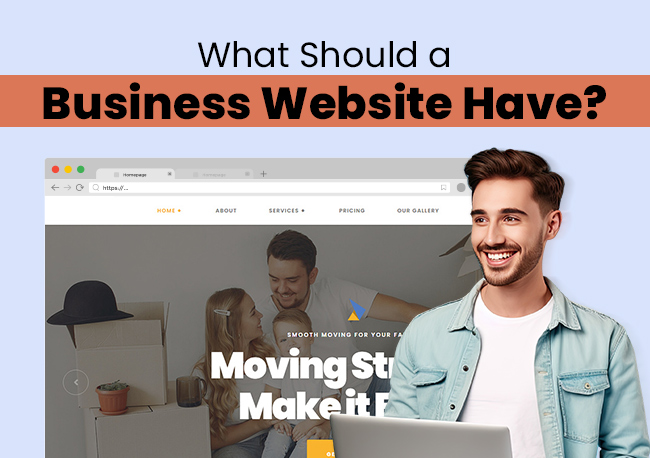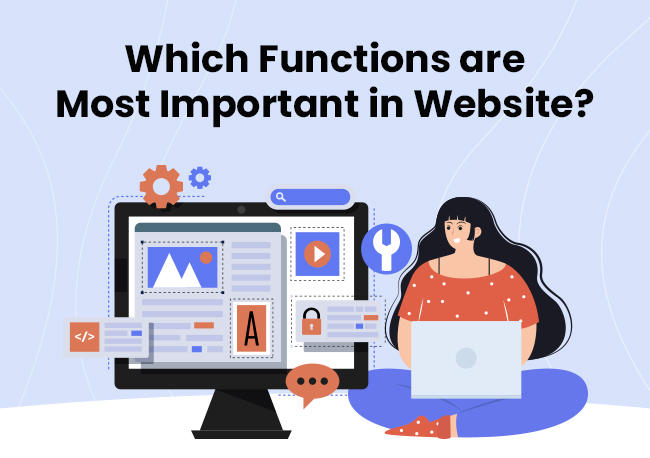| Getting your Trinity Audio player ready... |
Regardless of your industry, you must remember a few things if you want your business to succeed. Nowadays, one of these things is a top-notch website.
Whether you’re designing a new website or revamping the one you’ve been using for years, one of the most common questions is: what should a business website have?
Your website is often the first place clients go to learn about you. It’s crucial to share all important details in a way that fosters trust and credibility. How you present company information can significantly affect your business success.
Importance of Website in Establishing an Online Presence
A business website is the cornerstone of any company’s online presence! In today’s world, you can’t ignore the importance of a website for small businesses.
Your website serves as your company’s 24/7 virtual entry door, bringing most of your online traffic. Nonetheless, despite its popularity, many firms struggle to optimize it effectively.
It provides a digital space where potential customers can explore products or services, learn about the company, and engage in meaningful interactions.
Let’s understand the importance of a business website:
- Approximately 97% of consumers search online for products and services.
- 70% of consumers prefer to compare prices and read reviews before jumping to any decision.
- Online reviews often influence 88% of buyers.
- 91% of customers visited stores because they were impressed with their online presence.
In an age where online presence is synonymous with credibility, a well-designed website is paramount for establishing trust and building brand recognition.
Also Read: Industries That Need Websites The Most
Features Every Business Website Should Have
You can start building your business website with a simple landing page,
But what other pages does your business need?
A website should align with the needs and expectations of your target audience and market. You need to create a website that clearly defines your goal, such as what you want users to learn or what action you want them to take.
Do you want users to:
★ Read an article?
★ Learn about a new feature?
★ Sign up for a newsletter?
★ Buy a product?
If you don’t have the answers to these questions, use search engines like Google to find insights. Search query reports and competitor websites give you an idea of what your target audience searches and what site visitors hope to find.
Once you’ve determined your goal and the action you desire from users, you can write down the web pages and landing pages your business needs.
Also Read: How Can You Make A Website Look More Professional?
Here are some features and pages that every website should have:
➢ User-Friendly Navigation
➔ Clear Menu Structure: A logically organized menu ensures visitors can easily navigate through different website sections. Key pages, such as contact information or product/service offerings, should be easily accessible.
➔ Easy Navigation Bar: An intuitive navigation bar enhances user experience, allowing for seamless movement between pages.
➔ Mobile Responsiveness: With the prevalence of mobile devices, ensuring the website is optimized for mobile devices & various screen sizes is imperative.
➔ Inclusion of Breadcrumbs: Website Breadcrumbs provide users with a clear path to the homepage, improving navigation.
➔ Search Functionality: A search bar facilitates quick access to specific information.
Also Read: What Makes A Good Website Checklist? A Complete Guide
➢ Engaging Homepage
➔ Compelling Headline & Tagline: An engaging headline and tagline concisely represent the brand’s core and its value.
➔ High-Quality Visuals: Eye-catching images or videos can create an immediate positive impact on visitors, knowing that the first impression is often the last.
➔ Effective Call-to-Action: Clearly defined CTA buttons prompt users to take desired actions, such as purchasing or contacting the business.
➔ Featured Products or Services: You can increase the website’s appeal by spotlighting Featured Products or Services on the homepage. Highlighting these top offerings grabs visitor attention, encouraging exploration and driving engagement.
➔ Customer Testimonials: Positive experiences of others speak volumes about your products or services and foster trust, credibility, and confidence among potential customers.
➔ Interactive Elements: Engage visitors with interactive elements like sliders, animations, or graphics. It will make navigation enjoyable and increase user experience.
➔ Social Media Integration: Connect the website with social media platforms for a broader audience reach.
➔ Featured Promotions or Offers: Showcase exclusive deals or limited-time offers prominently on the homepage, grab attention, and entice users to explore and take advantage of exciting promotions.
Also Read: How To Find All Pages On A Website?
➢ Professional Design
➔ Consistent Branding: You must ensure that branding elements such as logos, colors, and fonts are consistent throughout the website. Using an AI logo maker for free can help with this.
➔ Clear & Modern Layout: Adopt a modern and clean design layout for a professional appearance. It enhances user experience, ensuring easy navigation and a contemporary aesthetic that leaves a lasting impression.
➔ Readable Font: Choose a Readable Font for your website to ensure clear and accessible content. A font that prioritizes readability improves user experience, making information easily digestible for all visitors.
➔ Appropriate Color Scheme: Select a color scheme that aligns with the brand and enhances the visual appeal.
➔ High-Quality Images: Use high-resolution images to maintain a polished look.
➔ Quick Page Loading Speed: Quick page loading speed is crucial for enhancing user experience and improving SEO. Optimize images on the website by compressing and choosing the right formats, and minimize code by removing unnecessary characters and deferring unused JavaScript.
Also, it is important to select the best web hosting services, such as VPS servers or dedicated servers, for better performance. Additionally, use a CDN to distribute static files globally, reducing latency and speeding up load times.
➔ Cross-Browser Compatibility: Ensure a consistent and smooth user experience across various web browsers, guaranteeing accessibility and functionality for all visitors.
Also Read: Why Does My Website Load Slowly?
➢ Informative About Us Page
➔ Brief Company Overview: Provide a concise overview of the company’s history, mission, and values. Also, add values, offerings, what we are, and what sets us apart in sections on the page.
➔ Clear Mission & Vision: Articulate the company’s mission and vision to convey purpose.
➔ Core Values & Culture: Showcase the company’s core values and workplace culture.
➔ Proper Leadership Team: Introduce key leadership members with brief bios.
➔ Company Achievements: Highlight significant recognitions, awards, and achievements that define your journey and demonstrate your commitment to excellence.
➔ Transparency & Honesty: Foster transparency by sharing relevant information about the company’s operations.
➔ Future Plans & Innovations: Provide insights into the company’s future plans and commitment to innovation.
Also Read: Website Optimization Tips To Increase Website Performance
➢ Comprehensive Product/Service Pages
➔ Detailed Descriptions with Visuals: Clearly articulate the features and benefits of products or services. Include high-resolution images or videos showcasing products or services.
➔ Clear Pricing Information: Transparency in pricing builds trust with potential customers.
➔ Use Cases & Applications: Illustrate how products or services can be applied in real-world scenarios.
➔ Customer Reviews and Testimonials: Feature genuine customer reviews to build credibility.
➔ Related Products & Services: You can recommend related offerings at the end of the product description.
➔ FAQ Section: This section benefits both customers and you by streamlining information access and improving overall user satisfaction. In this section, you can address the most frequently asked customer queries.
Also Read: What Is A Sitemap & Why Do You Need It?
➢ Contact Information
➔ Physical Address: Adding a physical address to your website enhances trust and credibility, ensures legal compliance, and offers additional channels for customer communication.
➔ Phone Numbers: Customers often prefer calling for support or inquiries; a visible phone number streamlines this communication. It’s also crucial for effective communication, building trust, providing customer support, and offering a convenient channel for inquiries and emergencies.
➔ Email Addresses: Domain Email addresses on a website are crucial for formal and documented communication, professionalism, marketing, and providing users with a versatile and widely used means of contact.
➔ Contact Form: It’s mostly used to make it easy for customers to connect and inquire on blogs or B2B business websites.
➔ Social Media Links: Essential for expanding reach, engaging with the audience, sharing content, building brand presence, facilitating customer communication, and leveraging marketing opportunities.
➔ Business Hours and Map: Enhances customer convenience, builds trust, meets expectations, and aids in local search optimization.
➔ Links to Other Relevant Pages: Direct visitors to related pages for a comprehensive understanding of the business.
➢ Security and Privacy
➔ SSL/TLS Encryption: You must secure data transmission and protect sensitive information through SSL/TLS encryption. It fosters trust and confidence in users that the transaction is safe and your data is protected.
Also Read: 9 Types Of SSL Certificates – Make The Right Choice
➔ Secured Web Hosting: Choosing a reputable and secure web hosting provider is vital for business as it protects sensitive information and guards against cyber threats, maintaining customer trust.
With robust security measures, businesses can safeguard transactions, maintain website integrity, and establish a reliable online presence, fostering a secure digital environment for the company and its customers.
Also Read: 5 Things Small Business Should Know About Web Hosting
➔ Clear Privacy Policy: Clearly outline the privacy policy on the website to inform users how their data is handled.
➔ Regular Software Updates: Keep all your software updated to patch vulnerabilities.
➔ Firewall Protection: In the digital world, every online business must implement a robust firewall for added security.
➔ Secure Payment Processing: Use secure payment gateways if your website sells products or services that need online transactions.
➔ A Habit of Taking Regular Backups: Every company needs regular website backups to prevent data loss or breach.
➔ Provide Cookie Policy: in this section, you can Inform users about using cookies.
Also Read: Best Practices To Secure Your Website
➢ Quality Content
➔ Keep it Relevant: Provide content directly related to the business and its offerings. Consistency in messaging all pages supports your objective and contributes to a cohesive user experience.
Also Read: What Should You Consider When Developing Website Content?
➔ Aligning with User Needs: Define your website’s purpose by understanding your audience. Align it with the needs and expectations of your target audience to ensure visitors find value, boosting engagement and conversion.
➔ Keep Content Updated: Ensure all information on your website is up-to-date and accurate.
➔ Make it Unique & Visually Appealing: Offer content that distinguishes your business from competitors and incorporate visuals to complement textual content.
➔ Maintain Clarity & Consistency: Ensure a consistent tone and style throughout the website that clearly communicates your idea.
➔ Keep it SEO-Friendly: Craft content with strategic keywords and relevant information, maximizing the potential for search engine discovery.
Let’s have a recap of what features your website should have with an infographic below:

Also Read: A Complete SEO Strategy Guide For New Websites
Conclusion
A business website is more than an online presence; it’s a dynamic tool for success.
Businesses can create a website that attracts and retains visitors by incorporating user-friendly navigation, engaging content, comprehensive information, and robust security measures.
A well-designed website is the cornerstone of a successful online strategy, fostering trust, credibility, and business growth.
FAQs
Branding is essential to a business website, shaping its design and content for a cohesive and recognizable identity.
It involves maintaining consistency in visual elements and messaging, ensuring easy navigation and responsive design, and highlighting unique selling points for differentiation.
According to a HubSpot Marketing study, businesses with blogs attract 55% more website visitors than those without. A regularly updated blog provides valuable content, keeping visitors informed and increasing the likelihood of conversions and customer loyalty.
Besides, the blog enriches SEO, increases organic traffic, establishes expertise, builds credibility, and fosters customer engagement.
We suggest investing in professional web design services while DIY options exist. Why? Professional web designers bring expertise, ensuring a polished, user-friendly site. This investment enhances brand image, user experience, and functionality, improving online visibility and increasing customer trust.




